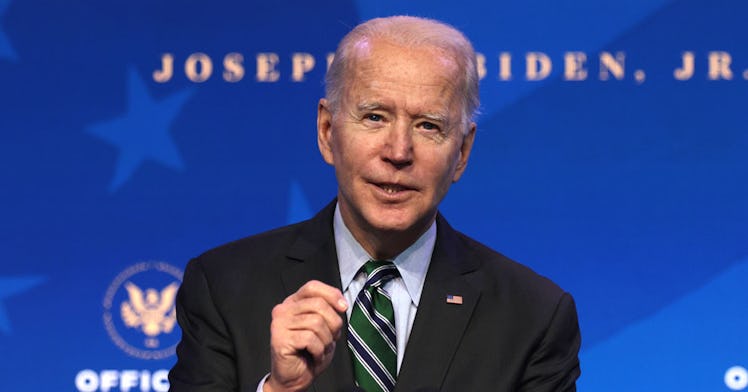What We Know About When Biden’s COVID-19 Stimulus Payments Will Go Out
Americans likely won't get more stimulus payments until the spring.

The economic stimulus check section of the $1.9 trillion coronavirus relief plan Joe Biden unveiled last week was, in a word, disappointing for many Americans who had expected something a bit more. After promising $2,000 checks to eligible Americans, the soon-to-be-president revealed that no, actually, they’d just be getting $1,400 checks to supplement the $600 checks that were passed as part of the stopgap spending bill at the end of 2020.
Setting this unfortunate bit of creative addition aside, the question becomes when, exactly, the undersized, but still desperately needed payments will actually go out, alongside the trillions of dollars in aid, vaccine funding, and more that will help Americans overcome the pandemic. The news on that front is also disappointing, although not unexpected, as his package is just a legislative idea rather than an introduced bill. Unsurprisingly, it looks like it will be months before that happens.
When Will You Get Your $1,400 Stimulus Check?
The likely best-case scenario is that Congress passes a bill by mid-February and money hits bank accounts before the end of the month. More likely is that a package is passed by the end of March and checks go out in early April.
Why the delay? Republicans are likely to push back on the relief package, lowering its price tag from nearly $2 trillion to $1 to $1.5 trillion, analyst Hunter Hammond told CBS News. Even though additional payments are widely supported and not expected to be a point of contention in negotiations, haggling over other aspects of the bill will likely last a while, and Congress isn’t exactly known for working expeditiously even when the health of the economy is at stake.
These calculations are based on Democrats gaining the support of the ten GOP senators needed to invoke cloture and end a filibuster of the bill. In the unlikely event that they don’t make enough concessions to the right to do so, the Democrats could use a special process known as budget reconciliation. It would only require the support of the 50 Democratic senators (and soon-to-be President of the Senate Kamala Harris), but it could also delay the passage of the bill.
The bottom line is that more stimulus payments are probably coming, but they probably aren’t coming any time soon.
This article was originally published on